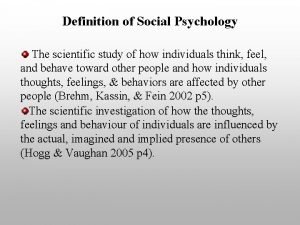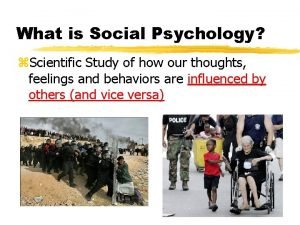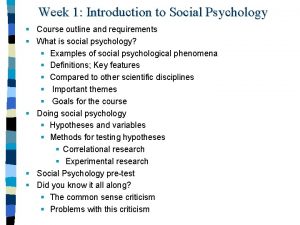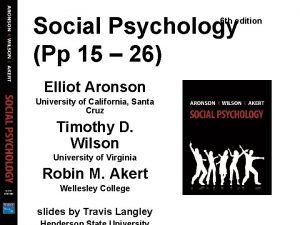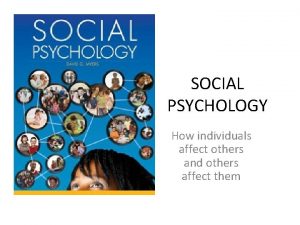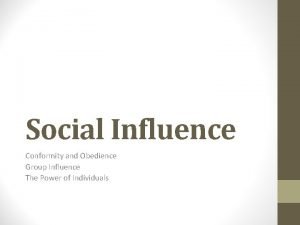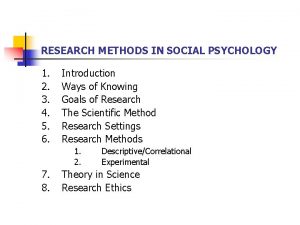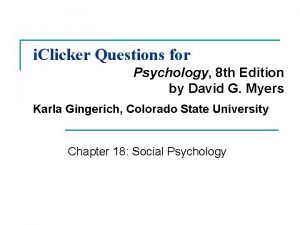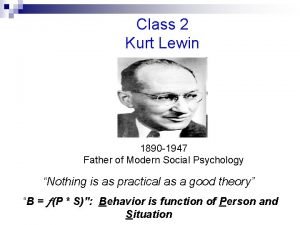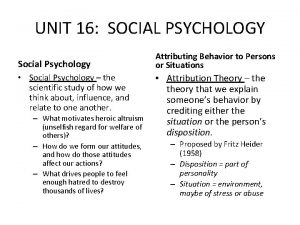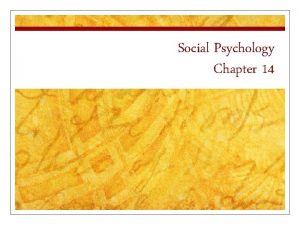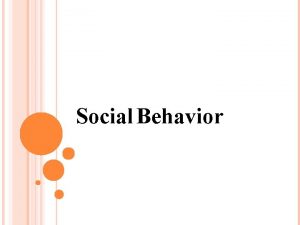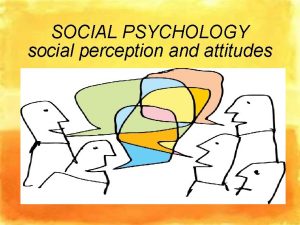Chapter 18 Social psychology Chapter 18 social psychology






































- Slides: 38

Chapter 18 Social psychology Chapter 18 social psychology 1

Social psychology • The scientific study of how we think about, influence, and relate to one another. Chapter 18 social psychology 2

Chapter 18 social psychology 3

Attribution theory • Suggest how we explain someone’s behavior – by crediting either the situation or the person’s disposition. Chapter 18 social psychology 4

Fundamental attribution error • The tendency for observers, when analyzing another’s behavior, to underestimate the impact of the situation and to overestimate the impact of personal disposition. Chapter 18 social psychology 5

Attitude • Feelings, often based on our beliefs, that predispose us to respond in a particular way to objects, people, and events. Chapter 18 social psychology 6

Foot in the door phenomenon • The tendency for people who have first agreed to a small request comply later with a larger request. Chapter 18 social psychology 7

Conformity • Adjusting one’s behavior were thinking to coincide with the group standard. Chapter 18 social psychology 8

Normative social influence • Influence resulting from a person’s desire to gain approval or avoid disapproval. Chapter 18 social psychology 9

Social facilitation • Stronger responses on a simple or well-earned tasks in the presence of others. Chapter 18 social psychology 10

Social loafing • The tendency for people in a group to exert less effort when pooling their efforts towards attaining a common goal than when individually accountable. Chapter 18 social psychology 11

Deindividualism • The loss of self-awareness and selfrestraint occurring in group situation that foster arousal and anonymity. Chapter 18 social psychology 12

Group polarization • The enhancement of the group’s prevailing inclination through discussion within the group. Chapter 18 social psychology 13

groupthink • The motive thinking that occurs when the desire for harmony and decisionmaking group overrides a realistic appraisal of alternatives. Chapter 18 social psychology 14

Prejudice • And unjustifiable attitude toward a group and its members. • Prejudice generally involve stereotype believes, negative feelings, and a predisposition to discriminatory action. Chapter 18 social psychology 15

Stereotype • A generalized belief about a group of people. • It can be accurate but often overgeneralized. Chapter 18 social psychology 16

Discrimination • Unjustifiable negative behavior toward a group or its members. Chapter 18 social psychology 17

In group • “US” – people with whom one shares a common identity. Chapter 18 social psychology 18

Outgroup • “Them”-those perceived as different report from ones in group. Chapter 18 social psychology 19

In group bias • The tendency to favor one’s own group. Chapter 18 social psychology 20

Scapegoat theory • The theory that prejudice offers an outlet for anger by providing someone to blame. Chapter 18 social psychology 21

Just world phenomenon • The tendency of people to believe the world is just and that people therefore get what they deserve and deserve what they get. Chapter 18 social psychology 22

Aggression • Any physical or verbal behavior intended to hurt or destroy. Chapter 18 social psychology 23

Frustration aggression principle • The principle that frustration-the blocking of any attempt to achieve some goal-creates anger, which can generate aggression. Chapter 18 social psychology 24

Conflict • A perceived incompatibility of actions, goals, or ideas. Chapter 18 social psychology 25

Social trap • A situation in which the conflicting parties, by each rationality pursuing their self interest, become caught in mutually destructive behavior. Chapter 18 social psychology 26

Mere exposure effect • The phenomenon that repeated exposure to novel stimuli increases liking of them. Chapter 18 social psychology 27

Passionate love • In a aroused state of intense positive absorption in another, usually presented at the beginning of a love relationship. Chapter 18 social psychology 28

Companionate Love • The deep affectionate attachment we feel for those with whom our lives are intertwined. Chapter 18 social psychology 29

Equity • A condition in which people receive from a relationship in proportion to what they give to it. Chapter 18 social psychology 30

Self-disclosure • Revealing intimate aspects of oneself to others. Chapter 18 social psychology 31

Altruism • Unselfish regard for the welfare of others. Chapter 18 social psychology 32

Bystander effect • The tendency for any given bystander to be less likely to get aid if other bystanders are present. Chapter 18 social psychology 33

Social exchange theory • The theory that our social behavior as an exchange process, the aim of which is to maximize benefits and minimize costs. Chapter 18 social psychology 34

Reciprocity norm • An expectation that people will help, not hurt, those who have helped them. Chapter 18 social psychology 35

Social responsibility norm • an expectation that people will help those dependent upon them. Chapter 18 social psychology 36

Superordinate goals • Shared goals that override differences among people and require their corporation. Chapter 18 social psychology 37

GRIT Graduated and reciprocated initiatives and tension reduction-strategy designed to decrease international tensions. Chapter 18 social psychology 38
 Deindividuation
Deindividuation Fundamental attribution error ap psychology
Fundamental attribution error ap psychology Social psychology is the scientific study of:
Social psychology is the scientific study of: Social thinking and social influence
Social thinking and social influence Social thinking and social influence
Social thinking and social influence Social thinking social influence social relations
Social thinking social influence social relations Chapter 12 social psychology
Chapter 12 social psychology Chapter 13 social psychology
Chapter 13 social psychology Dispositional attribution ap psychology
Dispositional attribution ap psychology Application of psychology
Application of psychology Positive psychology ap psychology definition
Positive psychology ap psychology definition Nature and scope of psychology
Nature and scope of psychology Health psychology definition ap psychology
Health psychology definition ap psychology Self fulfilling prophecy example
Self fulfilling prophecy example Social psychology course outline
Social psychology course outline Examples of informational social influence
Examples of informational social influence Social behavior psychology definition
Social behavior psychology definition Social facilitation psychology definition
Social facilitation psychology definition Unit xiv social psychology
Unit xiv social psychology Father of social psychology
Father of social psychology Social psychology presentation
Social psychology presentation Social psychology lecture
Social psychology lecture Sociology vs social psychology
Sociology vs social psychology What is informational social influence in psychology
What is informational social influence in psychology Research methods in social psychology
Research methods in social psychology Nature and power of prejudice
Nature and power of prejudice Personal adjustment definition
Personal adjustment definition Who is the father of social psychology
Who is the father of social psychology Father of social psychology
Father of social psychology Sociology vs social psychology
Sociology vs social psychology Although frieda is typically very reserved as
Although frieda is typically very reserved as Unit 14 reading guide social psychology
Unit 14 reading guide social psychology Evaluation of bowlby's monotropic theory
Evaluation of bowlby's monotropic theory Normative conformity example
Normative conformity example Father of social psychology
Father of social psychology Social trap psychology definition
Social trap psychology definition Social psychology and common sense
Social psychology and common sense Enriched model of dementia care
Enriched model of dementia care Social psychology
Social psychology


